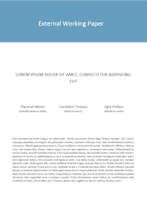Education is an important determinant of economic outcomes, but access to education is highly unequal.
Across OECD countries, the likelihood of attending a tertiary institution doubles if one parent has at least a high-school diploma, and more than quadruples if one parent has also attained tertiary education (OECD, 2013). Even among academically well-prepared students, there are substantial gaps in college attendance, graduation, and the quality of college attended (Hoxby and Avery, 2012).
Despite these patterns on the extent and source of educational inequalities, research from psychology and sociology shows that education systems are generally thought to be meritocratically fair (Darnon et al., 2018; Wiederkehr et al., 2015). Beliefs in the meritocracy of the education system may affect real outcomes via (lack of) support for equalizing policies because educational differences and the resulting economic outcomes are seen as fair. Such beliefs may also result in prejudices against the less-educated, holding them personally responsible for their situation (Kuppens et al., 2018).
In this project, we aim to explore the relationship between beliefs in educational meritocracy, preferences for equalizing policies (e.g. income redistribution or equality of opportunity), real behavior (e.g. donations to charities that aim to reduce educational inequalities), and implicit attitudes towards the less-educated. To this end, we will conduct an online experiment to causally shift beliefs in educational meritocracy and examine how these beliefs influence support for equalizing policies, real behavior, and attitudes towards the less educated.
Studying this relationship is important for several reasons. First, it matters for policy as the feasibility of equity-oriented education reforms requires the public to recognize the role that external circumstances play in shaping educational outcomes. Second, it matters for cohesion and polarization. One of the deepest divides in politics today is between those with and without a college degree, with education being one of the best predictors of recent political conflicts like Trump and Brexit (Goodwin and Heath, 2016). Underestimating the role that external circumstances play in shaping educational outcomes may contribute to this sense of low esteem by engendering negative attitudes towards the less-educated and encouraging us to attribute blame and responsibility for their failure to get educated.
This project makes several contributions, all of which have potential applications in other contexts: we (1) use a demographically diverse sample and controlled experimental setting to examine how meritocratic beliefs causally affect support for equalizing policies, real behavior, and implicit attitudes towards the less-educated, (2) investigate how responsiveness of these outcomes to information provision varies with socio-demographic characteristics, and (3) introduce a novel survey tool that measures implicit attitudes towards the less-educated. Our focus on meritocracy in educational attainment complements existing studies that examine how meritocratic beliefs, broadly defined, affect preferences over economic allocations (Almas et al., 2020; Andre, 2021).
The findings from this study directly benefit the fund’s mission. Information asymmetries are an important source of market failure. In this context, misperceptions about how meritocratic the education system is results in lower support for equalizing policies, relative to the full-information scenario. We assess the extent to which information provision can “correct” these misperceptions and consequently increase support for equalising policies and change attitudes towards the less-educated.
Sources of Educational Inequality and Redistributive Behaviour: Experimental Evidence
Sources of Educational Inequality and Redistributive Behaviour: Experimental Evidence, Ines Lee and Eileen Tipoe (2023).
This paper examines how beliefs about the relative importance of factors beyond an individual’s control (“fixed” factors) affect support for policies or initiatives that reduce education-related inequalities. In an online survey on a demographically diverse US sample (N=2,000), we find that providing information about the extent and source of inequalities in 4-year college attendance: (1) strengthens participants’ beliefs in the role of fixed factors in educational inequalities, (2) positively affects real donation behavior, and (3) increases stated support for pre-college policies aimed at students from lowincome families but not post-college redistribution



